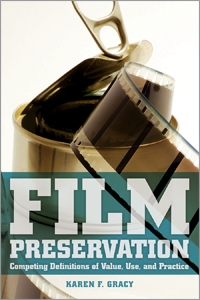Primary tabs
You don't need to be an ALA Member to purchase from the ALA Store, but you'll be asked to create an online account/profile during the checkout to proceed. This Web Account is for both Members and non-Members. Note that your ALA Member discount will be applied at the final step of the checkout process.
If you are Tax-Exempt, please verify that your account is currently set up as exempt before placing your order, as our new fulfillment center will need current documentation. Learn how to verify here.
- Description
- About the author
- Reviews
This book offers a unique window on the world of film archiving. The author brings a historical, economic, and social framework to bear upon this unique community, looking at the people, institutions, and corporations that play key roles in the preservation endeavor. Through ethnographic narratives that place the reader squarely within the scene, Gracy gives readers the context to understand fully the complexities of film archiving work, and what it means to be a member of this profession.
Provides an introduction to the major players in the film community and the internal and external forces that influence film preservation, as well as a background of the film preservation movement. The book also addresses the constraints of funding, intellectual property issues, and the orphan film movement. The primary focus is on the relationships among the various players: archives, studio and film preservation labs, and content owners.
The book draws material from the Gracy's field work. Some of the issues discussed include
- The great flexibility in how archivists use the term preservation
- How much control do archivists really have over film preservation
- Does archival imperative trump the physical imperative?
Karen F. Gracy
Karen F. Gracy is assistant professor at the University of Pittsburgh School of Information Sciences. She holds a Ph.D. and a master's degree in library and information science from the University of California, Los Angeles, and an M.A. in film and television studies from UCLA. Her dissertation, "The Imperative to Preserve: Competing Definitions of Value in the World of Film Preservation," examines the sociocultural contexts of decision making within the moving image archives community.
" . . . all archivists and conservators should read Gracy's book, because she describes wonderfully the subject of film preservation for the non-specialist, demanding a fuller appreciation of the skills and knowledge involved."
— David Lee, Wessex Film and Sound Archive, Business Archives Principles and Practice (May 2008)
"Karen Gracy's book is a unique archival ethnographic study of the film preservation world. It examines the values of the film preservation community and the myriad of details involved in the preservation process. Issues ranging from the theoretical to basics are covered in this important resource for all concerned with film preservation."
— Mary Ide, Director of the WGBH Archives
"Finally, we have a comprehensive overview of the challenges and possibilities of preserving motion picture film. In Film Preservation: Competing Definitions of Value, Use, and Practice, Karen Gracy offers a sophisticated balance of scholarship and advice that helps us think creatively about a largely neglected segment of our cultural heritage."
—Paul Conway, Associate Professor, School of Information, University of Michigan,and Fellow, Society of American Archivists



